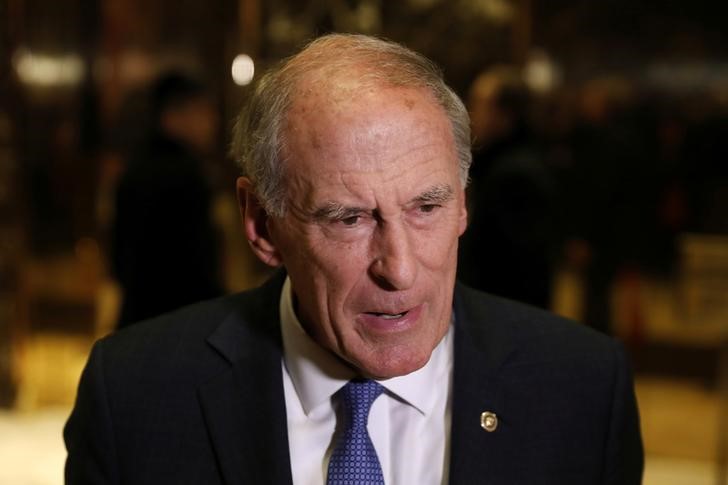Investing.com’s stocks of the week
By Steve Holland
WASHINGTON (Reuters) - President-elect Donald Trump on Thursday picked former U.S. Senator Dan Coats as his director of national intelligence, two senior transition officials said, as he puts his stamp on a U.S. intelligence community that he frequently criticizes.
The official announcement was expected this week as Trump makes decisions on some of the remaining major positions he must fill as he prepares to take over the White House on Jan. 20.
Coats, 73, is a traditional conservative from Indiana who just finished a six-year term in the U.S. Senate. He was also U.S. ambassador to Germany for Republican President George W. Bush.
Coats “would be an excellent choice,” Senate Intelligence Chairman Richard Burr, a North Carolina Republican, told reporters.
“Because Dan’s got the experience, he’s got the leadership skills having been an ambassador and I think his time on the committee has served him to understand what that role entails.”
One Democratic official familiar with Coats' background and views described him as a "very reasonable guy." Another U.S. official familiar with intelligence matters said he was "very well respected on both sides of the aisle."
A source close to the transition said Trump had also considered New Jersey Governor Chris Christie for the job but that Christie had chosen not to take it.
BUTTING HEADS OVER RUSSIA?
Trump has repeatedly expressed doubts about the U.S. intelligence community's assessment that Russia had a hand in hacking during the presidential campaign.
The Democratic official said Coats knew a lot about Europe and Russia and might "butt heads with Trump over Russia."
The president-elect was to get a briefing about the intelligence community's findings on the topic from senior U.S. officials on Friday at Trump Tower in New York.
Some U.S. intelligence officials on Thursday welcomed Coats' selection, saying they hoped his appointment was a sign that Trump was seeking to mend fences with the intelligence community after months of enmity over its assessment that Russia tried to influence the 2016 election through hacking.
One official, speaking on condition of anonymity to discuss a domestic political issue, said he hoped that if confirmed by the Senate, Coats could negotiate what he called "a truce" between the intelligence community and Trump's choice for national security adviser, retired Army Lieutenant General Mike Flynn, who was fired as Defense Intelligence Agency director by the current director of national intelligence, James Clapper.
Coats has been a vigorous defender of government surveillance programs, having voted against congressional reforms to the National Security Agency’s bulk collection of U.S. call records in 2015.
While on the Senate Intelligence Committee, Coats also joined other Republican members in 2014 in approving a minority report that defended the CIA’s use of harsh interrogation methods against detainees in secret foreign prisons, saying the program “saved lives and played a vital role in weakening al Qaida.”
The conclusion contrasted with the majority report that found the program failed to produce significant intelligence and that the CIA misled the Bush administration, Congress and the American public about the use of so-called Enhanced Interrogation Techniques.
The techniques included waterboarding, which simulates drowning and was condemned as torture by President Barack Obama, other senior officials and lawmakers, and human rights experts
Trump was also nearing decisions on two other Cabinet positions, agriculture secretary and secretary of veterans affairs, with announcements expected soon, the source close to the transition said.
The leading candidate to lead the U.S. Department of Agriculture was former Georgia Governor Sonny Perdue, although one source said Idaho Governor Butch Otter was also in the mix.
For Veterans Affairs, Trump met on Tuesday with Leo Mackay Jr., a former deputy secretary for veterans affairs and a senior vice president of Lockheed Martin Corp (N:LMT), about the Cabinet post.
